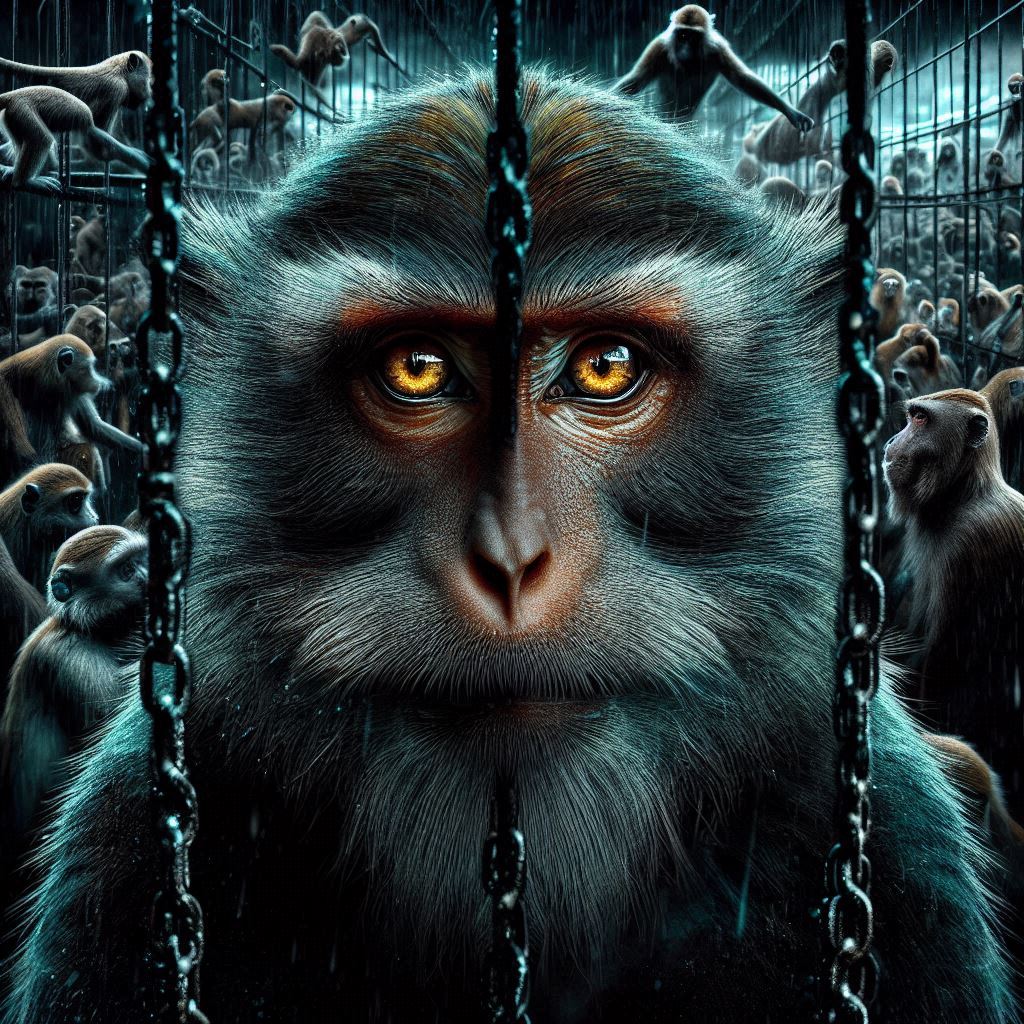
The Dark Side of the Exotic Pet Trade: Why Monkeys Belong in the Wild
Share
The Dark Side of the Exotic Pet Trade: Why Monkeys Belong in the Wild
The exotic pet trade is a multi-billion-dollar industry that sees animals taken from their natural habitats and sold as pets around the world. While some may see it as an exciting opportunity to own a rare or unusual animal, there is a dark side to this trade that often goes unseen. Among the most commonly trafficked animals are monkeys, who are prized for their intelligence, social nature, and unique appearances. However, the reality is that monkeys belong in the wild, and their place is not in captivity. In this blog post, we’ll explore the harmful effects of the exotic pet trade on monkeys and why these primates should remain in their natural environments.
The Impact of the Exotic Pet Trade on Monkeys
Monkeys, like all wild animals, are intricately connected to their natural environments. They play vital roles in maintaining the balance of their ecosystems, from seed dispersal to acting as prey for predators. When captured and sold in the exotic pet trade, they are forcibly removed from their habitats, leading to severe consequences for the species, ecosystems, and the individual monkeys themselves.
1. Destruction of Natural Habitats
The capture of monkeys for the pet trade often involves the destruction of their natural habitats. Forests and jungles, which are essential for monkey populations, are frequently cleared to make way for illegal logging or human settlements. The disruption of these environments exacerbates the problem, further endangering the species by leaving them without food, shelter, and the resources they need to thrive.
2. Inhumane Capture and Transport Methods
Monkeys are often captured in cruel and inhumane ways. Poachers use traps, nets, and even firearms to capture these animals, often injuring or killing them in the process. Once caught, monkeys are transported in unsafe conditions—often confined in tiny cages with little to no food, water, or medical care. Many do not survive the journey. The trauma associated with these captures can have lasting effects on the monkeys, both physically and emotionally.
3. Disrupted Social Structures
Monkeys are highly social animals that rely on their family groups for survival and emotional well-being. In the wild, they live in tight-knit communities where they develop relationships, learn from each other, and rely on their bonds for protection. When captured and sold into captivity, monkeys are often separated from their families and social groups, which can lead to loneliness, anxiety, and behavioral issues. Their natural social instincts are disrupted, leading to severe mental health problems.
4. Health Risks of Captivity
Monkeys in the exotic pet trade face numerous health risks. In captivity, they are exposed to diseases that they may not have encountered in the wild, and they are often kept in unsanitary conditions. Additionally, they are not provided with a diet suited to their nutritional needs, which can lead to malnutrition and other health complications. Many monkeys also suffer from the stress of captivity, which can further weaken their immune systems and make them more susceptible to illness.
5. Breed and Genetic Issues
Monkeys bred in captivity often suffer from genetic disorders due to inbreeding. Since the demand for exotic pets is high, breeders may not follow ethical breeding practices, leading to weak and unhealthy animals. These issues can cause physical deformities, neurological problems, and shorter lifespans. Many of the monkeys bred in captivity have never had a chance to live in a natural environment, depriving them of the opportunity to fulfill their natural instincts.
The Legal and Ethical Implications of the Exotic Pet Trade
The exotic pet trade is illegal in many parts of the world due to the significant harm it causes to both animals and ecosystems. However, despite laws aimed at protecting wildlife, the trade persists. In some regions, the lack of enforcement, combined with high demand, allows the exotic pet trade to continue flourishing.
1. Illegal Wildlife Trafficking
The illegal wildlife trade is a global issue that involves the smuggling of animals across borders for the purpose of profit. Monkeys, along with other exotic species, are often sold on the black market. These illegal activities fuel the extinction of species and contribute to the destruction of ecosystems. In many cases, the capture of these animals violates international laws designed to protect endangered species.
2. Lack of Regulation and Enforcement
Even in places where the exotic pet trade is illegal, regulations are often poorly enforced. Corruption, lack of resources, and insufficient laws make it difficult to prevent the smuggling and sale of monkeys. This leaves the trade largely unregulated, making it hard to stop the flow of monkeys into the pet trade.
3. The Ethics of Keeping Wild Animals as Pets
Keeping monkeys as pets raises significant ethical concerns. These animals are not suited for life in captivity. Their needs—physical, mental, and emotional—cannot be met by most pet owners. Monkeys are wild animals that require vast amounts of space, social interaction, and mental stimulation. Keeping them in small cages or as isolated individuals can lead to suffering, anxiety, and even violent behavior. Moreover, the act of removing a monkey from its natural environment is a violation of its basic rights as a living being.
Why Monkeys Belong in the Wild
Monkeys, as highly intelligent and social creatures, belong in their natural habitats, not in cages or private homes. Here are several reasons why monkeys should never be kept as pets:
1. Their Place Is in the Ecosystem
Monkeys play crucial roles in their ecosystems. They help maintain the health of forests by dispersing seeds, pollinating plants, and maintaining the balance of the food chain. Removing them from these environments disrupts not only their lives but the entire ecosystem they help sustain.
2. Protection of Biodiversity
Monkeys are an integral part of biodiversity, and their decline due to the exotic pet trade can have cascading effects on other species. By protecting monkeys and their habitats, we contribute to the overall health of ecosystems and preserve biodiversity for future generations.
3. Conservation Efforts
Conservation programs that protect monkeys in the wild are essential to preserving their populations and ensuring their survival. Protecting their natural habitats and reducing the demand for them in the pet trade can make a significant difference in efforts to keep monkey populations thriving.
4. They Deserve Freedom
Monkeys are not domesticated animals. Unlike cats and dogs, they have evolved to live in complex, dynamic social groups within wild environments. Monkeys deserve the freedom to roam, interact, and live as nature intended, not to be confined in a cage or subjected to the control of human owners.
How You Can Help
If you are concerned about the exotic pet trade and the plight of monkeys, there are several ways you can help:
• Support Wildlife Conservation Organizations: Donate to organizations that protect endangered species and work to end the exotic pet trade.
• Advocate for Stronger Laws: Support initiatives that strengthen wildlife protection laws and ensure the enforcement of those laws.
• Raise Awareness: Share information about the impact of the exotic pet trade on social media and within your community to reduce demand for exotic pets.
• Adopt, Don’t Shop: Choose to adopt domesticated animals from shelters rather than buying exotic pets from breeders or pet stores.
Conclusion: Protecting Monkeys and Their Future
The exotic pet trade poses a serious threat to monkeys and other wildlife. The capture and sale of monkeys as pets disrupts their social structures, harms their health, and contributes to the decline of species. Instead of supporting this cruel industry, we should work to protect monkeys in their natural environments, where they belong.
By raising awareness about the dark side of the exotic pet trade, supporting conservation efforts, and advocating for stronger laws, we can ensure that future generations of monkeys are able to live freely in the wild, where they can thrive.
Want to learn more about animal behaviors and fun facts? Check out:
